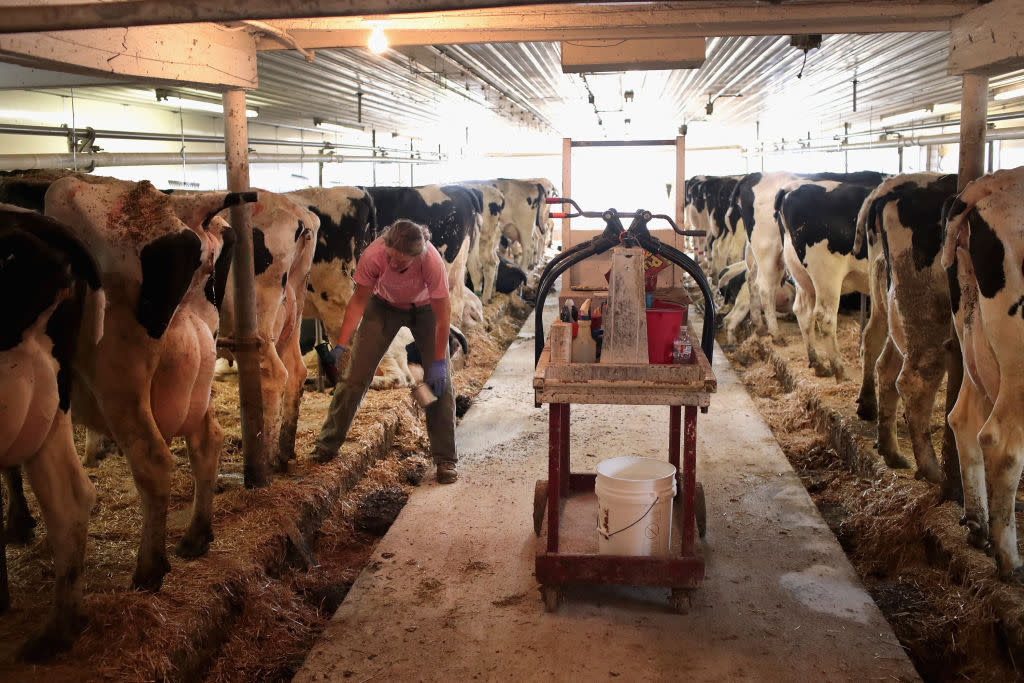DHHS urges farmworkers to be vigilant after detecting bird flu in Michigan resident

Dairy cattle infected by highly pathogenic avian influenza have large amounts of the virus in their milk. (Photo by Scott Olson/Getty Images)
Amid an ongoing outbreak of Influenza A across multiple states, the Michigan Department of Health and Human Services (DHHS) has identified its first case within the state.
Influenza A — also known as highly pathogenic avian influenza or bird flu — has been circulating in dairy and poultry farms across the U.S. this spring, with state and local officials monitoring closely for cases of human infection. There have been two cases of human infection reported in the U.S. since 2022, one in Colorado in 2022 tied to exposure to poultry, and one in Texas in early April, tied to exposure to dairy cattle.
The infection was identified in a Michigan farmworker who was regularly exposed to livestock infected with type A influenza, who has since recovered after experiencing mild symptoms. The Centers for Disease Control and Prevention (CDC) said risk to the public remains low.
The CDC said the infections might have happened when the workers’ eyes were splashed with contaminated fluid or if they touched their eyes with a contaminated hand.
“Given the high levels of … virus in raw milk from infected cows, and the extent of the spread of this virus in dairy cows, similar additional human cases could be identified,” the CDC said.
As of Wednesday, USDA data showed that 15 Michigan farms have had infections — the most of any state. The Michigan Department of Agriculture and Rural Development (MDARD) listed four more for a total of 19.
The initial source of infection in Michigan is believed to be sick dairy cows that were transported from Texas before they showed symptoms. The virus has transmitted from cows to other cows and to poultry.
The virus has infected eight commercial or backyard poultry flocks in Michigan since early April. Three of them were large egg-producing operations with a total of about 6.5 million birds.
Entire flocks are culled to prevent the virus’ spread. It is highly contagious and deadly for domestic birds, but cows typically recover in 10 to 14 days.
Dr. Natasha Bagdasarian, DHHS’s chief medical executive, said that Michigan has “led a swift public health response, and we have been tracking this situation closely since influenza A (H5N1) was detected in poultry and dairy herds in Michigan. Farmworkers who have been exposed to impacted animals have been asked to report even mild symptoms, and testing for the virus has been made available.
“The current health risk to the general public remains low. This virus is being closely monitored, and we have not seen signs of sustained human-to-human transmission at this point. This is exactly how public health is meant to work, in early detection and monitoring of new and emerging illnesses,” Bagdasarian said.
DHHS is also working alongside MDARD and local health departments to monitor the health of those exposed to ill animals.
“Since the first detection of influenza A (H5N1) in dairy cattle on March 29, Michigan has prioritized both the animal and human health aspects of this disease outbreak. Today’s news underscores the continued importance of limiting nonessential farm visits, including farm tours and field trips, as well as the use of personal protective equipment when working with livestock,” MDARD Director Tim Boring said in a statement.
MDARD has identified dairy and poultry farms in several Michigan counties that have tested positive for influenza A, and has been working with federal, state and local partners to address animal and public health concerns and mitigate the spread.
On May 1, Boring signed a Determination of Extraordinary Emergency Order bringing further protections to Michigan’s livestock and poultry industries and enhancing the U.S. Department of Agriculture’s April 24 order requiring testing of dairy cattle moving between states as well as mandatory reporting of positive Influenza A results in livestock.
DHHS has advised people working on poultry and dairy farms to receive their seasonal flu vaccination. While this will not prevent infection with avian flu viruses, it can reduce the risk of coinfection with avian and flu viruses.
The CDC also advises those who come into contact with infected animals to use protective equipment including gloves, eye protection, and an N95 respirator or well-fitting face mask.
It also recommends hand washing after touching birds, changing clothes before interacting with healthy poultry if you’ve previously interacted with potentially infected birds, and advises against touching your mouth, nose, or eyes after contact with birds or surfaces and materials that might be contaminated with saliva, mucus or feces from birds.
The USDA recently announced it will reimburse dairy farms for costs associated with those precautions, including protective equipment for workers and heat treatments to inactivate the virus in contaminated milk.
Milk from sick cows is required to be discarded, but federal tests have detected fragments of the virus in the country’s commercial milk supply. Despite that, the Food and Drug Administration said it is safe to drink the milk, which is pasteurized to kill pathogens.
The states with bird flu infections among cattle include Colorado, Idaho, Kansas, Michigan, New Mexico, North Carolina, Ohio, South Dakota and Texas.
GET THE MORNING HEADLINES DELIVERED TO YOUR INBOX
The post DHHS urges farmworkers to be vigilant after detecting bird flu in Michigan resident appeared first on Michigan Advance.


